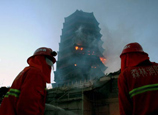
MANILA, April 9 (Xinhua) -- Unless emerging economies in Asia undertake radical changes in their energy policies, there will be graver environmental problems and wider disparity between the rich and the poor in the region, according to the Asian Development Bank (ADB).
In the latest report of Asian Development Outlook 2013, released on Tuesday in Hong Kong, the Manila-based ADB said that Asia could be consuming more than half of the world energy supply by 2035 and without major changes, carbon dioxide emissions will double.
"Asia must both contain rising demand and explore cleaner energy options, which will require creativity and resolve, with policymakers having to grapple with politically difficult issues like fuel subsidies and regional energy market integration," ADB chief economist Changyong Rhee said.
A paper, entitled Emerging Economies and the New Energy Security Agenda, released last year, also pointed out the importance of crafting a new energy security scenario that would address the effects of the rapid growth of Asian economies.
"The influence of the emerging economies on the energy markets is becoming as important as that of the developed economies. The new energy security agenda to be implemented in the coming years will have to deal with this scenario," the study said.
According to the study, the emerging economies have fed their demographic and economic growth with energy.
"Most analysts expect the emerging economies to continue gaining in political and economic influence over the coming years, with clear implications for energy security," the study said.
In its Asian Development Outlook 2013, which contains a separate chapter on energy, the ADB highlighted the complex balancing act the region faces to deliver energy to all its citizens while scaling back its reliance on fossil fuels.
The ADB said that if by 2035, the Asia countries merely expands energy access without fundamentally changing the way it consumes, the region's oil consumption will double, natural gas consumption will triple, and coal consumption will rise a whopping 81 percent, with costly and devastating environmental impacts.
As an emerging Asian economy, the Philippines, which imports 90 percent of its crude oil requirements, mostly from the Middle East, would be among those that should heed the ADB warning.
Every time there is a spike in oil price abroad, the price of gasoline and other oil products in the Philippines would correspondingly rise resulting in higher costs not only in transport but also in basic commodities.
What is ironic is that while the Philippines has proven oil deposits of 138 million barrels, its current rate of extraction is only 25,000 barrels a day, which is far below the consumption.
Recent discovery of deep-water oil resources has encouraged greater production of oil but it is still not enough to meet the country's petroleum needs without imports.
The Philippines also possesses 3.9 trillion cubic feet of natural gas reserves. Although extraction only began in 2000, production has been able to meet demand for natural gas every year without imports.
The ADB report said that limited indigenous energy resources present an additional challenge. With only 9 percent of proven global oil reserves, the region is currently on track to almost triple oil imports by 2035, rendering it significantly more vulnerable to external supply shocks.
In Asia, 1.8 billion people still rely on wood and other traditional fuel as their primary energy source, the ADB said.
Since modern energy access is essential for their social and economic advancement, Asia must find the political will and innovation to scrap outdated policies and recalibrate its energy mix, the ADB said.
According to the ADB, countries in Asia cannot meet all their power requirements on their own, so they must accelerate cross- border interconnection of power and gas grids to improve efficiency, cut costs, and take advantage of surplus power. "With increased cooperation, a pan-Asia energy market is achievable by 2030," the report said.
In the Philippines, while the country holds 260 million short tons of usable coal reserves and has recently increased extraction, consumption still far outpaces production, forcing the country to rely on coal imports to meet demand.
Because of its position as an island chain in the Pacific Ocean, the Philippines is located in a relatively active seismic area and geothermal energy allows the country to use this to its advantage.
Currently, the Philippines is the world's second highest producer of geothermal energy. The government has set a goal to surpass the United States as the highest producer in the world.
















 Stand in face of bulldozer
Stand in face of bulldozer
With water and electricity cut, lonely 'Nail House' struggling to stay


![]()
